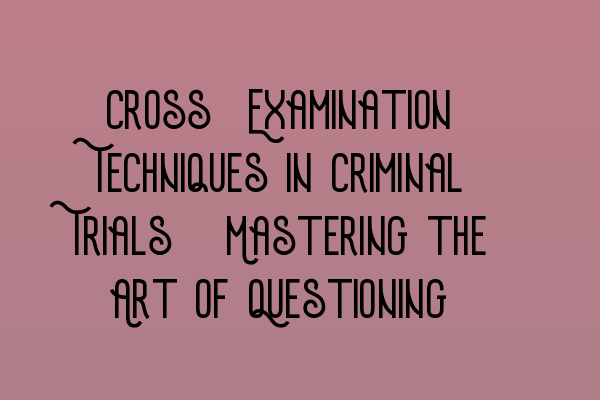Cross-Examination Techniques in Criminal Trials: Mastering the Art of Questioning
In criminal trials, cross-examination plays a crucial role in presenting a strong defense and proving the innocence of the accused. It is a skill that requires masterful questioning techniques to extract relevant information, challenge witness credibility, and weaken the prosecution’s case. This article aims to provide insights into effective cross-examination techniques that every criminal law practitioner should master.
1. Preparation is Key
Before entering the courtroom, meticulous preparation is essential to ensure a successful cross-examination. Thoroughly review the case, gather all relevant evidence, and strategize your questions to highlight inconsistencies and weaknesses in the prosecution’s case.
As part of your preparation, it is crucial to familiarize yourself with the witness’s background and previous statements. Look for any inconsistencies, biases, or motives that may impact their credibility. This information will aid in formulating targeted questions to expose any potential flaws in their testimony.
For comprehensive preparation, consider enrolling in SQE 1 preparation courses to enhance your knowledge and sharpen your skills in criminal law.
2. Establishing Control and Credibility
When conducting cross-examination, it is vital to establish control over the witness. Begin with questions that elicit straightforward, uncontroversial answers to build rapport and earn the court’s trust. This allows you to gradually transition into more challenging questions that may put the witness on the defensive.
By maintaining a calm and confident demeanor, you project credibility and confidence, which can influence the perception of the witness and the jury. Use your expertise in criminal law to demonstrate your command of the subject matter and discredit any attempts by the witness to portray themselves as an expert.
3. Mastering Questioning Techniques
The art of questioning lies in crafting insightful and precise questions that steer the witness towards the desired answers. Instead of asking open-ended questions, use leading questions to control the direction of the testimony. These questions often prompt the witness to respond with a simple “yes” or “no,” minimizing their ability to provide subjective or evasive answers.
When questioning the witness, be mindful of objections. Anticipate potential objections and formulate your questions in a way that avoids objections based on relevance, hearsay, or leading. By doing so, you maintain the flow of examination and prevent interruptions.
With the assistance of SQE 2 preparation courses, you can further enhance your questioning techniques and develop a comprehensive understanding of the criminal trial process.
4. Building a Strong Impeachment
Effective cross-examination involves discrediting the witness and highlighting any inconsistencies or contradictions in their testimony. Carefully analyze the witness’s previous statements and compare them to their current testimony. Look for deviations, omissions, or changes in their version of events to establish a strong impeachment.
By presenting the jury with concrete evidence of the witness’s inconsistencies, you weaken their credibility and cast doubt on their reliability. This can significantly impact the prosecution’s case and strengthen the defense.
For additional practice in criminal law and cross-examination techniques, consider incorporating SQE 1 practice exam questions and SQE 1 practice mocks into your study routine.
5. Adapting to Witness Responses
During cross-examination, witnesses may attempt to sidestep or evade questions. To effectively counter such responses, be quick on your feet and adapt your questioning style accordingly. Redirect the witness back to the question at hand by rephrasing or repeating it, ensuring that their evasiveness is exposed.
Additionally, actively listen to the witness’s responses to identify potential avenues for further exploration. Use their own words against them and exploit any gaps or contradictions. By staying attentive and responsive, you can uncover crucial information that bolsters your defense.
As an aspiring criminal law practitioner, mastering the art of cross-examination is essential for success in the courtroom. Continuously honing your skills through practical experience and ongoing professional development is crucial. Keep yourself updated with the SRA SQE exam dates to plan your preparation effectively.
In summary, cross-examination in criminal trials requires careful preparation, the establishment of control and credibility, mastery of questioning techniques, building a strong impeachment, and adapting to witness responses. By incorporating these strategies into your practice, you can effectively challenge the prosecution’s case, protect your client’s rights, and achieve the best possible outcome.
